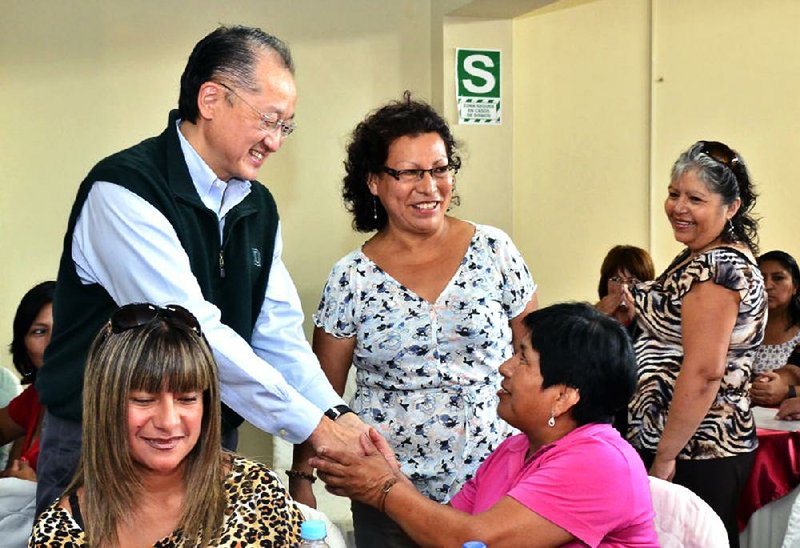WASHINGTON — The World Bank on Monday named as its next president Dr. Jim Yong Kim, a global health expert and the president of Dartmouth College, in a widely expected appointment that continues the longstanding tradition of an American leading the Washington-based development institution.
Kim, 52, will take over July 1, after the current president, Robert Zoellick, steps down at the end of his five-year term.
While the selection of Kim by the bank’s 25-member executive board was no surprise, the board had, for the first time, considered more than one candidate, a reflection of the increasing clout of emerging-market nations on the global stage.
“The old order has triumphed yet again, but this may be its last hurrah,” said Eswar Prasad, a professor of trade policy at Cornell University. “The tradition of carving up the top jobs at the major international financial institutions among nominees of advanced countries has become untenable and unjustifiable.”
Numerous African countries had rallied around Ngozi Okonjo-Iweala, the Nigerian finance minister and former World Bank managing director. Jose Antonio Ocampo, the former Colombian central banker and U.N. official, also was a candidate, though he withdrew from the race and threw his support behind Okonjo-Iweala on Friday.
Okonjo-Iweala and Ocampo always faced long odds, given the composition of the World Bank board: Europe, the United States and Japan control about half of the voting shares. But their candidacies reignited a debate over Washington’s continued control of the institution.
The bank has granted more power recently to countries such as China, Brazil and India, as the cash-rich and fast-growing economies are called on to finance development programs and multilateral institutions, not just to receive financing from them. In 2010, the World Bank increased the relative voting share of emerging economies. It also committed to an open, transparent and merit-based presidential selection process.
But those changes have not yet resulted in a non-American rising to the top of the organization. Traditionally, an American oversees the World Bank, which finances a wide variety of private and public development projects, while a European heads the International Monetary Fund.
The World Bank focuses on fighting poverty and promoting development. In recent decades, it has focused on poor nations in Africa, Asia and Latin America. It is a leading source of development loans for financing to build dams, road and other projects.
Kim’s focus on health and social projects and a lack of experience in economic policy or financial markets has raised questions about his capacity to head an institution with expertise ranging from infrastructure to climate change.
“It’s a legitimate concern, not because he couldn’t learn and have good advice once in office, but because that may take some time,” said Nancy Birdsall, president of the Washington-based Center for Global Development and a former World Bank official.
A number of prominent development and aid groups had criticized the race for remaining unfairly skewed to the American nominee’s benefit. The two candidates from emerging-market countries had also critiqued the selection process.
“It is clear that the process is shifting from a strict merit-based competition, in which my candidacy stood on strong grounds, into a more political-orientated exercise,” Ocampo said in his statement withdrawing from the race.
In a statement, the World Bank’s board said each of the nominees had “received support from different member countries, which reflected the high caliber of the candidates.”
But they did not indicate whether any of the 25 board members had pressed for Okonjo-Iweala or Ocampo, rather than supporting Kim. Traditionally, the board comes to a decision by consensus.
After the White House nominated Kim in March, he went on an around-the-world “listening tour” to rally support for his candidacy. Kim ultimately won the support of countries including Canada, Mexico, South Korea, Japan and Russia.
In a recent interview, Kim stressed that he wanted to make the bank as inclusive as possible, while achieving its mission of eradicating poverty and supporting economic development.
He also said he wanted to make the bank’s programs more data-driven.
“There’s no one-size-fits all. There’s no big idea that will lead to economic growth for everybody,” he said. “I think we must be evidence based and evidence-driven, and we must pay attention to local contexts.”
Kim is a physician and anthropologist by training. He is a founder of Partners In Health, a nonprofit organization that runs community-focused health programs in poor countries. He also worked at Harvard University, where he obtained his medical degree, and the World Health Organization, where he spearheaded a program to deliver anti-retroviral treatments to people living with HIV/AIDS. He’s been Dartmouth’s president since 2009.
Kim is also the first World Bank president to come from a developing economy. His family emigrated to the United States from an impoverished and war-torn Korea. Kim, the son of a dentist, grew up in Muscatine, Iowa.
Zoellick, the bank’s current president, said in a statement about Kim that, “His rigorous, science-based drive for results will be invaluable for the World Bank Group as it modernizes to better serve client countries in overcoming poverty.”
The White House selected Kim for his hands-on experience in poor countries. Senior administration officials said President Barack Obama was drawn to him as a practitioner, rather than a foreign-policy hand or a banker, like previous World Bank presidents.
“His deep development background coupled with his dedication to forging consensus will help breathe new life into the World Bank’s efforts to secure fast economic growth that is widely shared,” Treasury Secretary Timothy Geithner said in a statement. Information for this article was contributed by Sandrine Rastello and Chris Kay of Bloomberg News and by Martin Crutsinger of The Associated Press.
Front Section, Pages 1 on 04/17/2012
